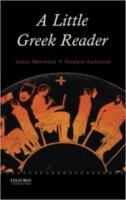
OUP (2015) p/b 294pp £12.99 (ISBN 0199311729)
How do you teach grammar in Greek? How do you ensure what you are doing is interesting and relevant?
This book takes a positive step towards answering the questions above. As fascinating as teachers can find the intricacies of e.g. purpose clauses in Greek, the work we ask students to do in learning endings and completing practice sentences is inevitably divorced from the context of the Greek they will encounter. This book aims to rectify the problem in providing a myriad of passages for students who have got the basics to explore all aspects of Greek grammar while also being exposed to un-adapted Greek texts.
The passages are grouped under grammatical headings (e.g. ‘participles’). Each group contains not one or two but around ten passages of varying length and difficulty with explanatory notes provided for each. There is a range of both prose and verse authors used, from Homer to the gospels. The passages are well chosen to provide pertinent insights into the Greek world, e.g. extracts from Herodotus explaining the purpose of his history, Antigone arguing why she buried her brother and so on. The notes are helpful and importantly the contexts of the readings are fully explained.
Although well-structured into grammatical sections, the passages themselves are not laid out that well, frequently running over pages, and the fount is rather small. No doubt this has been done to provide the maximum number of passages in the book: you certainly gain value for money on that front. There are useful appendices which include a description of authors, notes on dialect, metre and literary terms and a list of all vocabulary not glossed in the passages.
This is not a work to be read straight through from cover to cover but one which invigorates grammatical learning through exposing students to passages from some of Greek’s most thought-provoking literature, at an accessible level. An excellent book, then, for combining details of purpose clauses while deepening understanding of the Greek world.
Alex Smith—Head of Classics, Notting Hill and Ealing High School
